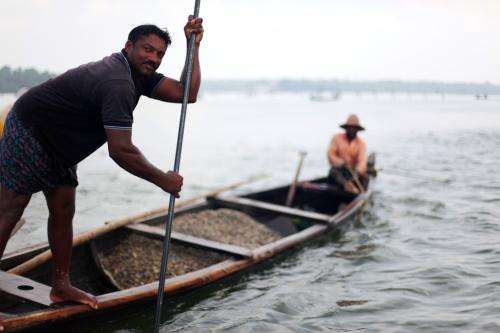India gets its first MSC certified fishery

Sustainable fisheries in the developing world have taken a significant step forward today with the certification of India's first clam fishery in Kerala, southern India.
The Ashtamudi short neck clam fishery is only the third fishery in Asia to have received this recognition.
"WWF-India initiated the MSC Certification of the Ashtamudi short-neck clam fishery in 2010 recognising the possibility of bringing in global sustainability standards for the benefit of conservation and local livelihoods. We are very pleased to see the culmination of these efforts with the recognition of India's first MSC certified fishery" said Ravi Singh, Secretary General & CEO, WWF-India.
The clam fishery in Ashtamudi dates back to 1981 and supports the livelihoods of around 3000 fishers involved in collection, cleaning, processing and trading the clams. Ashtamudi Lake is a Ramsar wetland of international importance and has extensive mangrove habitats harboring nearly 90 species of fish and 10 species of clams.
The growth of Ashtamudi's commercial fishery was driven by demand in Vietnam, Thailand and Malaysia in the 1980s and 1990s. By 1991, the catch peaked at 10,000 tonnes a year, but declined 50% in 1993 due to overfishing.
A closed season and mesh size restrictions for nets were introduced, along with a minimum export size and a prohibition on mechanical clam fishing. These measures showed immediate effects, and the clam fishery has sustained landings of around 10,000 tonnes a year for the past decade.
"We are extremely pleased to see this small-scale fishery become the first in India to be certified to the MSC's global standard for sustainable fishing. It will be an important addition to the growing number of developing world fisheries that are demonstrating their sustainability through the MSC's certification program," said David Agnew, MSC Standards Director.
MSC certification will mean the implementation of measures to ensure that this valuable resource is not overfished and its ecosystem is protected. It also opens up the scope for other fisheries in India to work towards MSC certification that will enhance conservation and sustainability of the resource while providing greater economic returns.
The MSC certification was a joint effort by WWF, the Central Marine Fisheries Research Institute (CMFRI) and the Kerala State Fisheries Department and the local fishing community. The certification demonstrates the power of collaboration between partners and the importance of grass-roots activism of fishers to protect the environment and their livelihoods.
Provided by WWF


















